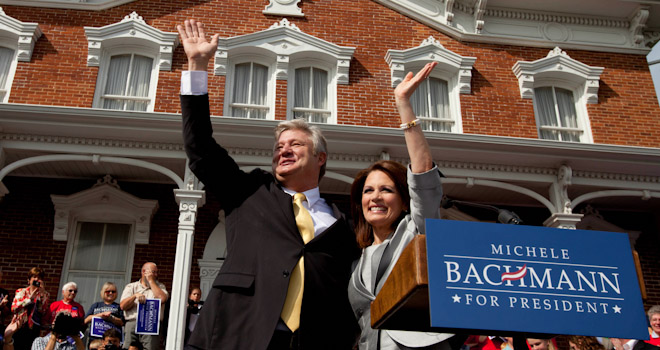Michele Bachmann’s extended family of 23 former foster children have become the unexpected stars of the Republican primary even though few details are known about them individually. The Minnesota Congresswoman brings them up frequently in debates, speeches and interviews as a showcase for her commitment to family values.
But Bachmann’s personal devotion to disadvantaged youth may be at odds with her public record on foster care. Critics warn that her zeal for budget cuts threatens vulnerable youngsters, while a leading Congressman on the issue says she’s been AWOL on foster care policy.
Bachmann arrived at Congress right as the House was working on its first major legislation on foster care in over a decade, the Fostering Connections and Increasing Adoptions Act of 2008. The brainchild of Rep. Jim McDermott (D-WA) and then-Rep. Jerry Weller (D-IL), the bill sought to improve life for foster children by encouraging placement with relatives, improving their access to health care, and keeping students in the same school when possible.
McDermott, who had worked as a child psychiatrist and had long advocated for reforming child welfare laws, was glad to see Bachmann testify at hearings on the legislation given her own extensive experience with the system. Speaking before McDermott’s subcommittee, she delivered a brief and moving account of her difficulties finding a quality education for her foster children. Bachmann also pitched her own legislation that would allow states to use vouchers to move foster children into private or home schools, injecting a hot-button partisan issue into the mix of what had been a mostly apolitical process (McDermott’s bill would end up passing unanimously on a voice vote).
McDermott appreciated her testimony, but he says that’s the extent of her involvement on the issue beyond her own voucher bill.
To be fair, Bachmann isn’t on the relevant Ways and Means committee, so it would have taken extra effort to get involved further. But McDermott said he was disappointed she didn’t go out of her way to do more given her extremely impressive personal background on the topic.
“Talk is easy — I generally try and measure people’s behavior in terms of what they actually do and I haven’t seen a lot,” he said. “This is not an easy area, but it’s certainly one where an awful lot of people have done very positive things.”
Others consider her a more active participant, however. Bachmann is a member of the Congressional Coalition on Adoption Institute, a bipartisan nonprofit that includes a number of other active lawmakers and raises awareness about adoption and foster care issues. Executive director Kathleen Strottman told TPM that Bachmann has been a “tireless advocate” for the group.
“She’s been very helpful in speaking about what drew her to become a foster parent and using that for state and local recruiting efforts,” she said. “A lot of what we hear from our programs is that it’s a sheer numbers issue.”
Indeed, child welfare experts interviewed by TPM universally praised Bachmann for her own sacrifices and the example they set for others. But they’re much more concerned about another one of Bachmann’s passions: huge and immediate budget cuts.
“Of course, the fact that she’s a foster care parent herself is very commendable,” Deborah Weinstein, executive director of the Coalition for Human Needs, said. “But it’s not the same as having a systemic view of what’s needed.”
Advocacy groups warn that Bachmann’s proposals to shrink government would have profound effects on child welfare services.The House Republican budget, which Bachmann voted for, would cut the program’s spending by $1 trillion over the next decade and give states freedom to lower benefits and raise eligibility requirements. Foster children, who automatically qualify for Medicaid benefits, make up a tremendously disproportionate amount of its spending, especially on mental health services. Bachmann likely understands these difficulties better than anyone: all 23 of her foster children were teenage girls suffering from psychiatric disorders. In addition, her husband’s therapy clinic has taken in over $137,000 in Medicaid funds to help treat low-income patients.
“These are children that have experienced trauma, have been through abuse and neglect, and generally speaking have high rates of acute illness, mental health needs, and special health needs,” Tim Briceland-Betts, public policy director at the Child Welfare League of America, told TPM. “The concern here is that many, many children would not get their needs met.”
He added that those cuts pale in comparison to his nightmare scenario (and Bachmann’s dream) of a balanced budget amendment, which would cut hundreds of billions of dollars in annual spending immediately and threaten efforts to combat poverty across the board.
Other cuts could have a powerful indirect effect on the system. A major goal of policy experts is keeping low-income families stable enough that children won’t require foster care. To this end, experts say aid like food stamps and unemployment benefits are crucial to prevent kids from falling into crisis. Bachmann voted twice against extending unemployment benefits and the Ryan plan would cut the food stamp program by $127 billion over the next decade.
“We don’t know yet what these cuts will do to child welfare programs directly, but it’s hard to think you can divorce child welfare from the ability of children to have nutritious food,” Weinstein said.
Bachmann’s Minnesota, which has one of the best records on child welfare in the country, has taken this holistic philosophy to heart: advocacy groups there credit local programs aimed at supporting struggling families with their state’s relative success.
“The notion behind these approaches is that most of the kids are [in foster care] for neglect, not abuse, and it’s highly associated with poverty and the stress that goes along with it,” Marcie Jefferys, Policy Development Director at Children’s Defense Fund-Minnesota. “We’re really concerned about the cuts at the federal level.”
E-mails to the Bachmann campaign requesting comment were not returned.






